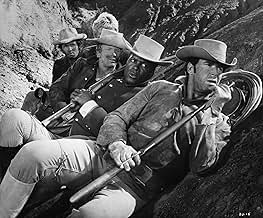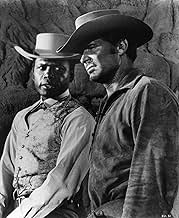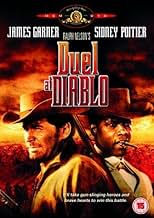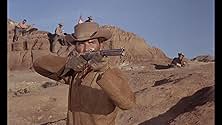CALIFICACIÓN DE IMDb
6.5/10
4.7 k
TU CALIFICACIÓN
En territorio apache, un hombre busca al asesino de su mujer india y una ama de casa abandona a su marido, para unirse a la tribu de su amante apache.En territorio apache, un hombre busca al asesino de su mujer india y una ama de casa abandona a su marido, para unirse a la tribu de su amante apache.En territorio apache, un hombre busca al asesino de su mujer india y una ama de casa abandona a su marido, para unirse a la tribu de su amante apache.
- Dirección
- Guionistas
- Elenco
- Premios
- 1 nominación en total
Ralph Nelson
- Col. Foster
- (as Alf Elson)
Armand Alzamora
- Ramirez
- (sin créditos)
Ralph Bahnsen
- Trooper Nyles
- (sin créditos)
Timothy Carey
- Deputy Clem
- (sin créditos)
Jeff Cooper
- Trooper Casey
- (sin créditos)
Kevin Coughlin
- Norton
- (sin créditos)
Robert Crawford Jr.
- Trooper Swenson - Bugler
- (sin créditos)
Opiniones destacadas
What makes this film interesting albeit unconventional are various themes that swirl beneath the main story line. Made at the time when the Civil Rights movement was in full swing, the film subtly touches on issues that were important during the 60s (e.g. racial tolerance, treatment of women and minorities). The film also has a brutal hard edge to it when it comes to the violence, death and the mayhem that takes throughout. The score gives a sense of desperation and inevitability which enhances its hard edge. Unlike many films of the genre, there is no clear cut protagonist or antagonist. The characters are realistic and more than mere two-dimensional cartoon characters for which the viewer could identify with. Overall, it is a thought provoking film that deserves a look in.
in an age when black actors were confined to black roles, this film shows Poitier in a role that could easily have been played by a white actor-plus he's the coolest dude in the movie.
Bill Travers doesn't have to do an American accent.
this was from a time that people believed that there could be major characters with foreign accents in the USA who weren't villains.
Of course the USA at this time, and at any time, had plenty of odd accents. Except in movies.
The credits are waaaay more imaginative that you'd normally expect.
The music is highly "different" The camera-work is very strange- all those overhead shots.
I love this movie, and is a film I can watch again and again. It's very stylised-the lines are delivered like they were from a comic book.
You know-the sort of thing Quentin T "discovered"
Bill Travers doesn't have to do an American accent.
this was from a time that people believed that there could be major characters with foreign accents in the USA who weren't villains.
Of course the USA at this time, and at any time, had plenty of odd accents. Except in movies.
The credits are waaaay more imaginative that you'd normally expect.
The music is highly "different" The camera-work is very strange- all those overhead shots.
I love this movie, and is a film I can watch again and again. It's very stylised-the lines are delivered like they were from a comic book.
You know-the sort of thing Quentin T "discovered"
James Garner is a good lead in this rousing Cavalry v. Indians western. There are very good battle scenes between between the outnumbered soldiers and the attacking Indians. The underlying issues of prejudice add an interesting touch to the movie as well with James Garner's character struggling with the death of his Indian wife and the Bibi Andersson character struggling with raising her baby fathered by an Indian brave.
As in any good western, the scenery also plays an important part and the southern Utah settings are particularly striking. The musical soundtrack is a little off-beat for a western, but also very good. Dennis Weaver, Sidney Poitier, and Bill Travers all add to the movie with good supporting performances.
As in any good western, the scenery also plays an important part and the southern Utah settings are particularly striking. The musical soundtrack is a little off-beat for a western, but also very good. Dennis Weaver, Sidney Poitier, and Bill Travers all add to the movie with good supporting performances.
What terrific production values—that trek across a hellishly barren Utah desert had me off the couch, running for a water pitcher. And catch all those cavalrymen, Indians, and wild horses, enough for at least ten more westerns. Then there's the great James Garner to headline, along with a spiffy Sidney Poitier. So, why isn't this a top-notch horse opera, given such promising prospects.
For one thing, there's about ten sub-plots too many. Heck, just the ordeal across the desert should be enough for most westerns without over-crowding the storyline. Sure, the script is making a good point about racism with Ellen's half-Indian baby. But do we need the soap opera sub-plot with husband Dennis Weaver that's mainly a distraction. Then there's Poitier showing it wasn't just white guys who won the west. And, of course, the screenplay has to carve out a large enough role for a second headliner. Add to that Garner's search for whoever scalped his wife that is sort of tacked on at the end, and we've got enough plot material for three more features.
Sure, the movie's heart is in the right place. But messages are one thing, while merging them into a fluid narrative is another, and here the sub-plots add to the general problem of too much storyline clutter. The root of the problem, I expect, was hiring too many name stars, even if Travers and Andersson are known mainly to foreign audiences. Speaking of the cast, Garner's unusual skills are largely wasted in a role any number of imposing presences like Clint Walker could have easily handled.
And I never thought it would happen, but by about the twentieth skirmish across the desert, I actually got a little bored with all the repetitive stunts and endless shooting. 'More', it seems, is not always better, and I suspect the lesson is there can be too much action even in an action movie.
Anyway, I don't want to simply dismiss the movie because of its excesses since there are also a number of good touches (Chata gets some respect as a leader of his people, even though we see him as cruel), along with the generous production values. I'm just sorry the movie doesn't succeed better given its praiseworthy side.
For one thing, there's about ten sub-plots too many. Heck, just the ordeal across the desert should be enough for most westerns without over-crowding the storyline. Sure, the script is making a good point about racism with Ellen's half-Indian baby. But do we need the soap opera sub-plot with husband Dennis Weaver that's mainly a distraction. Then there's Poitier showing it wasn't just white guys who won the west. And, of course, the screenplay has to carve out a large enough role for a second headliner. Add to that Garner's search for whoever scalped his wife that is sort of tacked on at the end, and we've got enough plot material for three more features.
Sure, the movie's heart is in the right place. But messages are one thing, while merging them into a fluid narrative is another, and here the sub-plots add to the general problem of too much storyline clutter. The root of the problem, I expect, was hiring too many name stars, even if Travers and Andersson are known mainly to foreign audiences. Speaking of the cast, Garner's unusual skills are largely wasted in a role any number of imposing presences like Clint Walker could have easily handled.
And I never thought it would happen, but by about the twentieth skirmish across the desert, I actually got a little bored with all the repetitive stunts and endless shooting. 'More', it seems, is not always better, and I suspect the lesson is there can be too much action even in an action movie.
Anyway, I don't want to simply dismiss the movie because of its excesses since there are also a number of good touches (Chata gets some respect as a leader of his people, even though we see him as cruel), along with the generous production values. I'm just sorry the movie doesn't succeed better given its praiseworthy side.
A bloody, brutal Western where the action never stops.
First, the Bad (let's get that out of the way). Like all Westerns, the plot has its flaws -- with an Indian war party off the reservation they would not have sent a shipment of ammunition through a narrow canyon guarded by only one squad of green recruits on unbroken/partly saddle broken horses. But so what? In the classic Western Stagecoach the Indians would have shot the horses pulling the stage and then finished off the passengers as opposed to shooting at the people in the coach. Also, Sidney Poitier's silver vest remains immaculate throughout the long desert journey and several pitched battles.
However, the movie moves so fast that you never really have time to stop and remind yourself that you have to "suspend disbelief" to watch it.
Next, the Good. On one level, it's a classic cavalry vs. Indians story. But viewed through a different lens than in earlier Westerns; the Indians are shown with some perspective, if not total sympathy, which probably makes this one of the first Westerns to get beyond a one dimensional view of them. There are a variety of interesting subplots which flesh out the major characters and keep things twisting, turning, and moving along between the combat scenes. In fact, almost every one of the characters is angry about something, creating lots of tension between them. James Garner's character is looking for the men who raped and killed his (Indian) wife, Dennis Weaver's Will Grange is angry about almost everything, including that his wife was held captive by the Indians, Sidney Poitier's Toller (now a civilian) is mad that circumstances forced him to accompany the cavalry on this mission ....
Garner and Poitier give excellent performances and the other actors rise to the occasion, helping us forget that they are, in fact, Scottish or Danish.
At the end of the movie the various subplots are tied up and the issues are resolved with (in one case) a very surprising twist.
On top of that, you have a wonderful (almost superb, for this movie) Neal Hefti score, which always seems to correctly reflect the mood of the scene. It fits the movie even better because it makes heavy use of Western/military instruments: guitars, horns, drums, ....
Finally, the Ugly. There are some fairly graphic scenes here (although not exactly like in the Wild Bunch or Saving Private Ryan). The Apaches could torture with the best of them and some of that appears in this movie, although we're spared the close-ups.
All in all, I must say that this is one of my long time favorites. I hope you enjoy it as much as I do!!
First, the Bad (let's get that out of the way). Like all Westerns, the plot has its flaws -- with an Indian war party off the reservation they would not have sent a shipment of ammunition through a narrow canyon guarded by only one squad of green recruits on unbroken/partly saddle broken horses. But so what? In the classic Western Stagecoach the Indians would have shot the horses pulling the stage and then finished off the passengers as opposed to shooting at the people in the coach. Also, Sidney Poitier's silver vest remains immaculate throughout the long desert journey and several pitched battles.
However, the movie moves so fast that you never really have time to stop and remind yourself that you have to "suspend disbelief" to watch it.
Next, the Good. On one level, it's a classic cavalry vs. Indians story. But viewed through a different lens than in earlier Westerns; the Indians are shown with some perspective, if not total sympathy, which probably makes this one of the first Westerns to get beyond a one dimensional view of them. There are a variety of interesting subplots which flesh out the major characters and keep things twisting, turning, and moving along between the combat scenes. In fact, almost every one of the characters is angry about something, creating lots of tension between them. James Garner's character is looking for the men who raped and killed his (Indian) wife, Dennis Weaver's Will Grange is angry about almost everything, including that his wife was held captive by the Indians, Sidney Poitier's Toller (now a civilian) is mad that circumstances forced him to accompany the cavalry on this mission ....
Garner and Poitier give excellent performances and the other actors rise to the occasion, helping us forget that they are, in fact, Scottish or Danish.
At the end of the movie the various subplots are tied up and the issues are resolved with (in one case) a very surprising twist.
On top of that, you have a wonderful (almost superb, for this movie) Neal Hefti score, which always seems to correctly reflect the mood of the scene. It fits the movie even better because it makes heavy use of Western/military instruments: guitars, horns, drums, ....
Finally, the Ugly. There are some fairly graphic scenes here (although not exactly like in the Wild Bunch or Saving Private Ryan). The Apaches could torture with the best of them and some of that appears in this movie, although we're spared the close-ups.
All in all, I must say that this is one of my long time favorites. I hope you enjoy it as much as I do!!
¿Sabías que…?
- TriviaJames Garner's first western since leaving Maverick (1957) and Sidney Poitier's first theatrical western.
- ErroresAs Willard hands his wife a gun, he says there are two cartridges in gun. However, it can be seen that all six chambers are loaded.
Bullet noses can be seen in the chambers on the left side of the cylinder but a minute or so later, the right side is on camera and shows 3 empty chambers.
- Citas
Ellen Grange: They all think that any decent woman would prefer to die than live as an Apache squaw. Maybe they're right.
Jess Remsberg: Death comes soon enough. Anyone who hurries it is a damn fool.
- Créditos curiososThe United Artists logo is sliced off the screen with a bloody Calvary Saber, slicing an "X" across the screen, revealing the opening scene. At the end, the same saber slices the live picture away, as (sort of) a fade out.
- ConexionesFeatured in Across 110th Street (1972)
Selecciones populares
Inicia sesión para calificar y agrega a la lista de videos para obtener recomendaciones personalizadas
- How long is Duel at Diablo?Con tecnología de Alexa
Detalles
- Tiempo de ejecución
- 1h 43min(103 min)
- Color
- Relación de aspecto
- 1.66 : 1
Contribuir a esta página
Sugiere una edición o agrega el contenido que falta





































